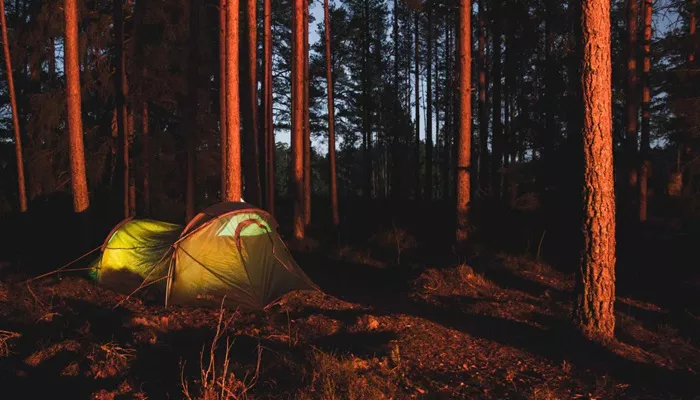In an era where the call of the wild has never been louder, wild camping has emerged as a favored pursuit for those seeking to break free from the constraints of modern life. Social media platforms are flooded with captivating images of campers nestled in idyllic, remote locations, their tents pitched against a backdrop of majestic mountains or serene forests. The promise of unadulterated natural beauty, the chance to disconnect from the digital world, and the allure of self – reliance have drawn countless individuals to embark on wild camping adventures.
However, beneath the romanticized facade lies a reality that demands respect and caution. As more people venture into the wilderness, the risks associated with wild camping become increasingly apparent. Stories of unexpected weather disasters, dangerous wildlife encounters, and individuals getting lost in remote areas serve as stark reminders that this form of outdoor exploration is not without its perils. Wild camping is an exciting way to connect with nature, but it comes with risks. This article will explore the safety of wild camping, provide tips, and share expert advice to help you stay safe.
Understanding Wild Camping
Wild camping means setting up camp in remote areas, away from designated campsites. It offers freedom and solitude but requires careful planning.
Benefits of Wild Camping
- Connection with Nature: Experience untouched landscapes.
- Solitude: Enjoy peace away from crowds.
- Adventure: Explore off-the-beaten-path locations.
Risks of Wild Camping
- Weather: Sudden changes can be dangerous.
- Wildlife: Encounters with animals can occur.
- Isolation: Help may be far away in emergencies.
Preparing for Wild Camping
Proper preparation is key to a safe trip. Here’s what you need to know.
Research Your Location
- Legal Restrictions: Check if wild camping is allowed.
- Terrain: Understand the landscape and potential hazards.
- Weather Forecast: Be aware of expected conditions.
Essential Gear
- Tent: Choose one suitable for the weather.
- Sleeping Bag: Ensure it’s appropriate for the temperature.
- First Aid Kit: Include bandages, antiseptic, and any personal medications.
- Navigation Tools: Map, compass, and GPS device.
- Food and Water: Pack enough supplies and a water purification method.
Physical Preparation
- Fitness Level: Ensure you’re fit for the terrain.
- Skills: Know basic survival skills like fire-making and navigation.
Setting Up Camp
Choosing the right spot and setting up camp correctly is crucial.
Selecting a Campsite
- Flat Ground: Avoid slopes to prevent sliding.
- Shelter: Look for natural windbreaks like trees or rocks.
- Water Source: Camp near water but not too close to avoid flooding.
- Wildlife: Avoid areas with signs of animal activity.
Setting Up Your Tent
- Stability: Secure your tent firmly.
- Ventilation: Ensure proper airflow to avoid condensation.
- Safety: Keep the entrance clear for easy exit.
Staying Safe During Your Trip
Once you’re set up, follow these tips to stay safe.
Weather Awareness
- Monitor Changes: Be alert to sudden weather shifts.
- Protection: Have rain gear and warm clothing ready.
Wildlife Safety
- Food Storage: Keep food in bear-proof containers or hang it from a tree.
- Distance: Observe animals from afar and avoid feeding them.
- Noise: Make noise to avoid surprising animals.
Health and Hygiene
- Clean Water: Always purify water before drinking.
- Waste Disposal: Follow Leave No Trace principles to minimize impact.
- Personal Hygiene: Use biodegradable soap and wash away from water sources.
Emergency Preparedness
Be ready for emergencies with these steps.
Communication
- Emergency Contacts: Share your itinerary with someone.
- Devices: Carry a fully charged phone and a backup power source.
First Aid
- Knowledge: Know basic first aid procedures.
- Kit: Keep your first aid kit accessible.
Evacuation Plan
- Routes: Identify multiple exit routes.
- Signals: Know how to signal for help if needed.
Common Mistakes to Avoid
Avoid these common pitfalls to ensure a safe trip.
Underestimating the Environment
- Research: Don’t overlook the importance of understanding your surroundings.
- Preparation: Always prepare for the worst-case scenario.
Overpacking
- Essentials: Bring only what you need to avoid being weighed down.
- Balance: Find a balance between being prepared and overloading yourself.
Ignoring Local Regulations
- Permits: Obtain necessary permits if required.
- Respect: Follow local guidelines to protect the environment.
Expert Tips for Safe Wild Camping
Learn from experts to enhance your safety.
Plan Thoroughly
- Details: Plan every aspect of your trip, from route to meals.
- Flexibility: Be ready to adjust plans based on conditions.
Stay Informed
- Updates: Keep up with weather and local news.
- Community: Join forums or groups for advice and updates.
Practice Leave No Trace
- Principles: Follow the seven Leave No Trace principles to minimize your impact.
- Responsibility: Take responsibility for your actions and their impact on nature.
Conclusion
Wild camping can be safe if you prepare well and stay aware. By understanding the risks, planning carefully, and following safety tips, you can enjoy a memorable and secure outdoor adventure. Always respect nature and be ready for emergencies to ensure a positive experience.
This article provides a comprehensive guide to the safety of wild camping, offering practical advice and expert tips to help you stay safe while enjoying the great outdoors. Whether you’re a seasoned camper or a beginner, these insights will help you prepare for a successful and secure wild camping trip.
Related topics:
How Much Does Long-Term Camping Cost?
What Can You Do When You Go Camping?

